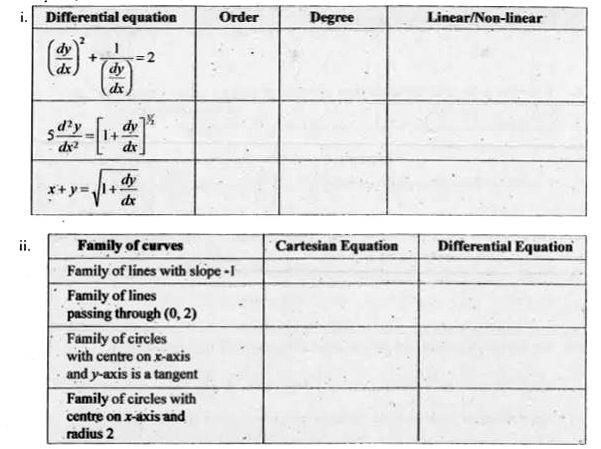The differential equation y.dydx+x=C represents a Solution in Tamil
family of hyperbolas
family of parabolas
family of ellipses
family of circles
The correct Answer is:D
Step by step video, text & image solution for The differential equation y.(dy)/(dx)+x=C represents a by Maths experts to help you in doubts & scoring excellent marks in Class 12 exams.
Updated on:21/07/2023Topper's Solved these Questions
- DIFFERENTIAL EQUATIONSBOOK - NEW JOYTHI PUBLICATIONCHAPTER - DIFFERENTIAL EQUATIONSEXERCISE - CONTINUOUS EVALUATION (ASSIGNMENT)
1 Video
- CONIC SECTIONS BOOK - NEW JOYTHI PUBLICATIONCHAPTER - CONIC SECTIONS EXERCISE - EXERCISE - HYPERBOLA
9 Videos
- INTEGRALS BOOK - NEW JOYTHI PUBLICATIONCHAPTER - INTEGRALS EXERCISE - OBJECTIVE TYPE QUESTIONS
34 Videos
Similar Questions
Complete the following tables

View SolutionThe vertices of the hyperbola 9x2−16y2=144
View Solution∫ealogxdx is equal to
View SolutionGeneral solution of the differential equation y=x(dy)/(dx)+(dx)/(dy) represents
View SolutionGeneral solution of the differential equation y=xdydx+dxdy represent
View SolutionSolution of the differential equation x dy -y dx = 0 represents-
View SolutionWhich does the solution of the differential equation xdydx=y represent ?
View Solutionअवकल समीकरण ydydx+x=A (जहाँ, A एक अचर है) क्या निरूपित करता है?
View Solutionसिद्ध कीजिए की y=cx+ac अवकल समीकरण y=xdydx+ady/dx का हल है।
View SolutionThe differential equation ydydx+x=a (a being a constant ) represents :
View SolutionThe solution of the differential equation xdydx−y=3 represents is a family of
View SolutionDifferential equation y(dy)/(dx)+x=c Which of the curves represents the total.
View SolutionShow that y=cx+ac is a solution of the differential equation y=xdydx+adydx.
View SolutionThe solution of the differential equation xdydx−y=3 represents a family of
View SolutionProve that y=cx+ac is a solution of the differential equation, y=xdydx+adxdy
View SolutionShow that y = cx + (a)/(c) is a solution of the differential equation y = x(dy)/(dx) + (a)/((dy)/(dx)) .
View Solution